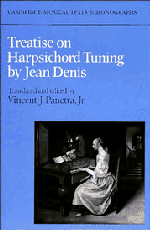Book contents
- Frontmatter
- Contents
- Acknowledgments
- TRANSLATOR'S INTRODUCTION
- 1 Jean Denis and the Traité de l'accord de l'espinette
- 2 Jean Denis and meantone temperament
- 3 The eight tons of the church
- 4 Notes on the translation
- THE TRANSLATION
- Appendix A A comparison of parallel passages from the published writings of Jean Denis and Marin Mersenne
- Appendix B A transcription of the ‘Prelude for determining whether the tuning is good throughout’
- Bibliography
- Index
1 - Jean Denis and the Traité de l'accord de l'espinette
Published online by Cambridge University Press: 06 December 2010
- Frontmatter
- Contents
- Acknowledgments
- TRANSLATOR'S INTRODUCTION
- 1 Jean Denis and the Traité de l'accord de l'espinette
- 2 Jean Denis and meantone temperament
- 3 The eight tons of the church
- 4 Notes on the translation
- THE TRANSLATION
- Appendix A A comparison of parallel passages from the published writings of Jean Denis and Marin Mersenne
- Appendix B A transcription of the ‘Prelude for determining whether the tuning is good throughout’
- Bibliography
- Index
Summary
The Traité de l'accord de l'espinette, first published in 1643 and issued in its second and final version in 1650, is the first French treatise devoted exclusively to keyboard performance practice. Jean Denis, the author of the Traité, was both a harpsichord maker of renown and the organist of a prominent Paris church. Thus, though he is not a ‘learned’ theorist in the traditional sense, Denis does qualify as an authority worthy of careful study.
Denis's Traité appeared during a time of transition in French theoretical writings, and was one of the harbingers of a new era. The more important French treatises of the sixteenth and early seventeenth centuries were the work of humanists, learned academicians who attempted to relate music to mathematics, philosophy, and the body of knowledge as a whole. They told much of theory, but far less of contemporary practice. Around the middle of the seventeenth century, however, detailed treatises written by musicians and composers began to appear, and these documents placed far more emphasis on practical matters than on the philosophy or aesthetics of music. Among their authors were Bénigne de Bacilly, Guillaume-Gabriel Nivers, Jean Millet, and Jean Denis.
With its comments on such fundamental matters as tuning, ornamentation, and the relationship of organ and choir in liturgy, Denis's treatise was clearly directed to practicing musicians rather than readers interested in the more speculative aspects of music theory.
- Type
- Chapter
- Information
- Treatise on Harpsichord Tuning , pp. 3 - 13Publisher: Cambridge University PressPrint publication year: 1987



